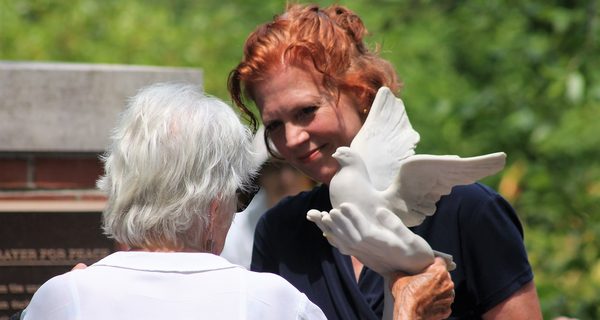Mary Margaret Earl accepts her award from her former teacher.
By James Kinneen
Hometown Weekly Reporter
Sunday afternoon was a busy one at Sherborn’s Pacifist Memorial, as the day featured the dedication of new bronze plaques in honor of John Lewis, Helen Keller, Julian Bond, Richard Gregg, Pete Seeger, Barry Crimmins, Paramahansa Yogananda, and Britt and Nan Pendergrast, the presentation of the International Courage of Conscience Award to Senior Minister and Executive Director at the UU Urban Ministry in Boston Mary Margaret Earl, the installation of The World Peace Time Capsule which is scheduled to be opened in the year 2121 and the blessing of the Global Pandemics Bereavement Stone and Carriage.
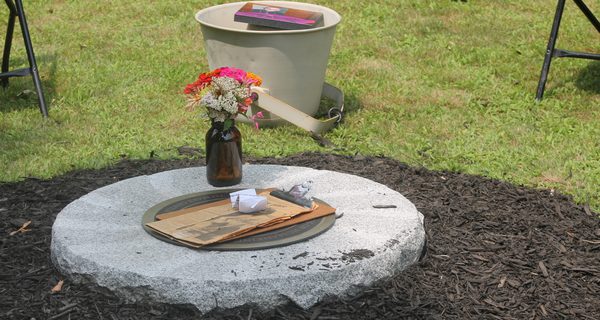
While the day was unsurprisingly somber given the many references to COVID-19, wars and violence overall, after the ceremonial turning of the rain stick to begin the ceremony, emcee and former Courage of Conscience Award winner Jimmy Tingle did crack some jokes to lighten the mood. Tingle told a story about the blizzard of 2015, when after hours of shoveling a woman stole his spot. Explaining how he blew up at the woman, Tingle screamed “I don’t care if you are my wife, that’s my spot!” which drew some laughs. He used the story to connect to a lesson about peacemaking beginning at home.
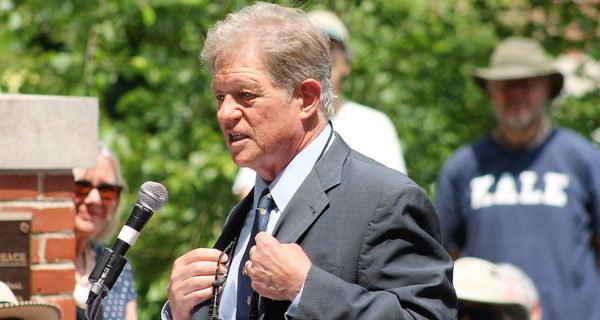
On a more serious note, Lewis Randa (who did joke about how many times he and a former student have been arrested together) talked about the lesser known JFK quote, “War will exist until that distant day when the conscientious objector enjoys the same reputation and prestige that the warrior does today,” and how that inspired the creation of a memorial celebrating those who seek to show that “peace is not only possible, but possible through peaceful means,” and that it is “better to endure violence in pursuit of peace than to inflict it.”
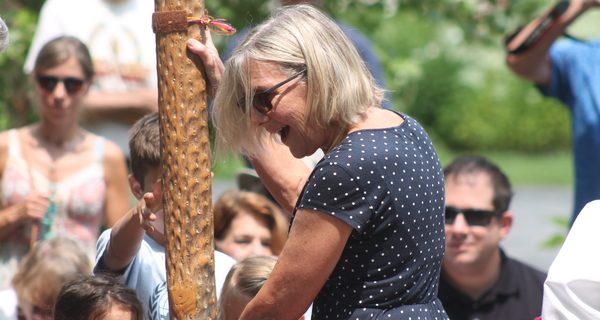
Dr. Stefan Schindler read his “Peace Abbey Peace Poem”, a performance of which is available to view on YouTube, complete with an accompanying instrumental, before Dot Walsh introduced and presented Mary Margaret Earl with her Courage of Conscience Award. Earl is Executive Director at the UU Urban Ministry in Boston, as well as a graduate of the BU School of Divinity. She noted that the great thing about the award is that, as opposed to so many other awards, people don’t have to have special talents or skills to win it, as everyone has a conscience.
The Boston Minstrels sang Pete Seeger’s “Where Have all the Flowers Gone” before their lead singer explained why his plaque was being added to the others. Seeger wasn’t the most well-known musician to get a plaque this go-round - that would be George Harrison, who was introduced by Michael Parks Randa (who recently directed the movie “Best Summer Ever”), who spoke mostly about Harrison’s work for Bangladesh.
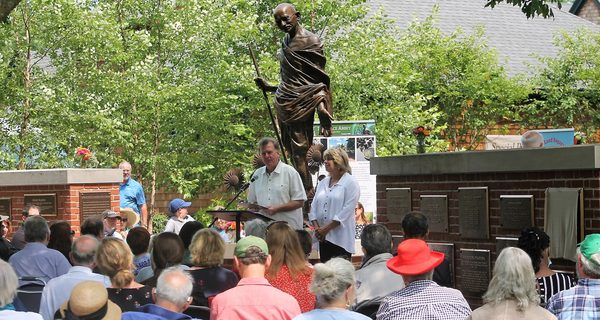
But it hasn’t been the best summer ever for many people, largely because of the global pandemic which has led to the death of so many. To that end, there was also the Global Pandemics Bereavement Stone, a large stone dedicated not just to the victims of COVID, but of other pandemics like HIV. The stone “serves as an expression of gratitude for the extraordinary contributions and sacrifices made by healthcare and essential service workers throughout the world: and it holds the thoughts and prayers of all those who came to it in sorrow and bereavement.”





